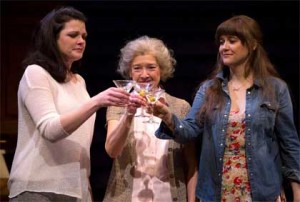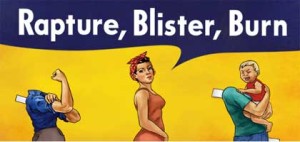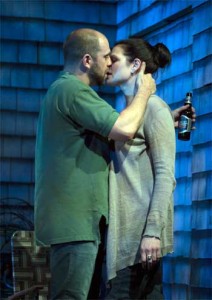Play (2012)
by Gina Gionfriddo
Directed by Peter DuBois
Huntington Theatre Company
Calderwood Pavilion
Boston Center for the Arts
South End
Boston
May 24 – June 30, 2013
With Kate Shindle (Catherine Croll), Annie McNamara (Gwen Harper), Timothy John Smith (Don Harper), Nancy E. Carroll (Alice Croll), Shannon Esper (Avery Willard)

Nancy E. Carroll as Alice Croll
Shannon Esper as Avery Willard
in “Rapture, Blister, Burn”
Photo: T. Charles Erickson
Courtesy Huntington Theatre Company
Catherine (Kate Shindle), a successful fortyish academic who has made a name for herself in academia, and beyond, through her books in gender studies, comes to visit her mother, Alice (Nancy E. Carroll), who, as luck would have it, lives right near Catherine’s old graduate school friend, Gwen (Annie McNamara), and her husband, Don.
Gwen and Don have two sons and a life beset by varieties of troubles. Don is a dean at a local college but has nothing like the career that Catherine has. And Gwen, who never realized her academic ambitions, is waist deep in familial maintenance. Staying with her mother, who is in frail health, Catherine basks in her success, but also realizes what she does not have. And, in reverse, Gwen and Don, under the glare of Catherine’s success, see the length of their own shadows.
Gina Gionfriddo is a brilliant gagster. She can write a line like nobody and draw easy laughs out of almost nothing. This play is hysterically funny and entertaining at every turn. Somehow Gionfriddo captures the vernacular so perfectly that, without seeming to seek to get a rise, she does so time and again. She has a real talent for snappy, unpretentious writing which captures cogently wry observations in deceptively ordinary and accessible speech.
There is a lot of wonderful acting here too.
Nancy E. Carroll, who cut a bitterly funny figure in last fall’s superb Good People at the Huntington Theatre, creates an equally searing, but endearing, figure here. Alice, in her hands, is full of wonderful surprises, always wrought with twists of Gionfriddo’s sassy invocations, and with all manner of justification for errant action. She is a scream.

opened in 2012
at Playwrights Horizons, NY
Shannon Esper, as the way too smart for her age babysitter, Avery, is remarkably on target with just about every line. In some ways, she carries the show with the pulverizing analyses she delivers, one after the other. Whether talking about the adults who employ her – Gwen and Don – or her own fragile love relationship with her offstage filmmaker boyfriend – she is direct and merciless. Esper’s delivery fits Gionfriddo’s prose like hand in glove. She has a blend of callowness and observational wisdom that fills the bill perfectly.
If the play were pure shtick, it would probably succeed solely on the virtuosity of Gionfriddo’s brilliance in turning a phrase. But the play tries to be more than that, and succeeds part of the way.
There is much hot air expelled here about theories of sexuality, relationship, gender and roles of women, invoking a referential array running the course from Betty Friedan to Phyllis Schlafly. That is fine and good, and frequently interesting, but it takes up a lot of radio time when some of the dramatic basics might have been explored more fully.
There is, indeed, a series of poignant turns to the plot, but there is barely enough time for Gionfriddo to explore the ramifications of the various switches before the curtain drops. We only learn the broad outlines of what motivates the characters at each turn and get little subtlety of viewpoint within them. In the first act, this is less noticeable, because it is practically all set-up for what follows. But when, in the second act, complexity arrives, the lack of time spent dealing with the consequences becomes obvious. Instead of development, there is more banter about feminist theory, which, by this point, begins to sound superficial rather than either controversial or inspirational.

Kate Shindle as Catherine Croll
in “Rapture, Blister, Burn”
Photo: T. Charles Erickson
Courtesy Huntington Theatre Company
Don’t get me wrong – this is a fun evening at the theatre. But it is fun because of its snappy dialogue and less so because of its satisfying treatment of the dramatic plot that underlies the shtick. Gionfriddo has a lot of talent as a writer. This entertaining play feels, however, like a shake that has only been partially blended, its humor vivid, but its drama not quite mixed in with its rapturous language.
– BADMan
Leave a Reply